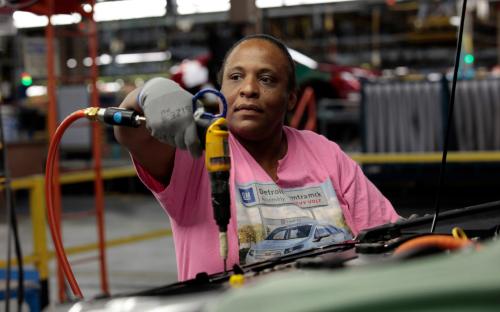More in-depth parsing of yesterday’s stark Trump administration budget sketch will be forthcoming. But for now, I want to point out the disturbing disconnect between President Trump’s expressed concern for the regions left behind and his budget outline’s treatment of three small but important agencies: the Manufacturing Extension Partnership (MEP), the Economic Development Administration (EDA), and the Appalachian Regional Commission (ARC).
None of these programs are huge—in fact, they are all tiny. Nor will the agencies’ proposed fate prompt the kind of moral outrage that is surrounding Trump’s big cuts to larger programs aimed at helping low-income Americans. And in the scheme of things these items matter far less than the proposed elimination of the Community Development Block Grant, the 18 percent proposed cut to the Department of Health and Human Services, the 18 percent proposed cut to the National Institutes of Health budget. As my colleagues Amy Liu and Nathan Arnosti note, cuts like these will destabilize communities and undercut regional economies even as they eviscerate federal-local partnerships in support of prosperity.
And yet with that said, the proposed eliminations from the 2018 budget of the MEP, EDA, and ARC represent an extraordinary contravention of what had seemed one of Trump’s most authentic campaign promises: to watch the back of blue-collar workers in America’s many struggling regions, especially in the Rust Belt and Appalachia.
The MEP, EDA, and ARC are each imperfect but meaningful components of the nation’s already emaciated efforts to catalyze economic renewal in hard-bitten regions. Specifically, each of the programs has a special relevance to frustrated communities in exactly the industrial heartland that anchored the Trump backlash. The $142 million-a-year MEP is an important network of decentralized state centers focused—at a time of radical disruption in manufacturing—on helping small- and medium-sized manufacturing companies in the heartland compete in global markets. The $215 million EDA, for its part, promotes economic development projects that spur entrepreneurship and innovation in distressed areas—often, again, in the Midwest and Southeast. And for its part, the Appalachian Regional Commission funds programs to promote economic opportunities in 13 Appalachian states, mostly Trump states, with much of its work focused on coal-dependent communities.
Focusing especially on MEP, it seems particularly perverse that yesterday’s “skinny” budget note proposes sun setting one of the nation’s few initiatives directly aimed at combatting the deindustrialization that has been destroying the kind of working-class jobs President Trump has celebrated and pledged to protect. MEP’s sole charge, after all, is to help small- and medium-sized companies deploy improved technology and superior management practices so as to withstand increased competition and maintain or expand employment. Now, the president has called for the dismantling of one of the nation’s few dedicated efforts to protect Main Street manufacturing jobs by addressing the fundamental need to compete harder. The inconsistency simply makes no sense.
To be sure, the document that the White House released on Thursday is neither a full budget, nor the last word on the 2018 appropriation process. Congress will have its say, and likely it will change much. But even so, manufacturing workers, regional economic development practitioners, and residents of struggling Appalachia should consider themselves warned. A president who has promised to improve the lot of working-class Midwesterners may not prove so reliable when push comes to shove.






Commentary
Trump budget would eliminate key Rust Belt supports
March 17, 2017